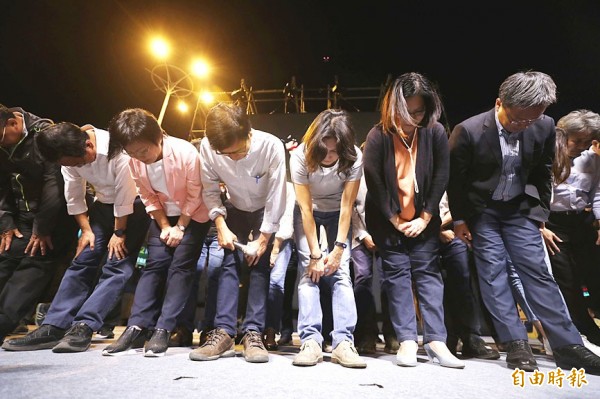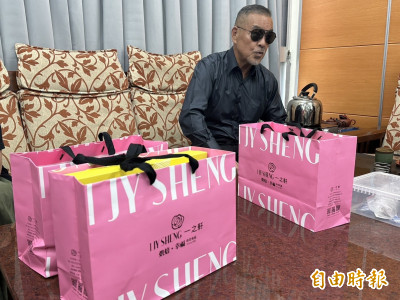《TAIPEI TIMES》 DPP needs new generation: lawmaker

Democratic Progressive Party candidate Chen Chi-mai, fourth left, and members of his campaign team bow to supporters in Kaohsiung on Saturday night after conceding defeat in the city’s mayoral race. Photo: CNA
SYSTEMIC ISSUES: Lee Chun-yi said that the party should not only consult political appointees and academics, but let lawmakers be more involved in policymaking
By Sean Lin / Staff reporter
It is time for senior Democratic Progressive Party (DPP) politicians to pass the torch to an aspiring generation, DPP Legislator Lee Chun-yi (李俊俋) said yesterday amid mounting criticism within the party after its losses in the nine-in-one elections on Saturday.
The DPP lost seven of the 13 cities and counties it held — the special municipalities of Taichung and Kaohsiung, as well as Chiayi City, and Yilan, Yunlin, Changhua and Penghu counties — to the Chinese Nationalist Party (KMT).
Of the 22 races, the DPP won only six: the special municipalities of Taoyuan and Tainan, as well as Keelung and Hsinchu City, and Chiayi and Pingtung counties.
At a post-election news conference on Saturday night at which President Tsai Ing-wen (蔡英文) stepped down as party chairperson, she apologized for having let the DPP’s supporters down and said that the party would engage in “serious self-introspection” and undertake internal reforms.
“Democracy taught us a lesson today and we shall humbly accept the higher standards set by the people,” Tsai said.
Lee said the results signify that people have come to see the DPP in a different light.
“It is important that the party shines the spotlight on other members, forms new ways of thinking and does something different,” Lee said.
Allowing “the aspiring class” — such as Taoyuan Mayor Cheng Wen-tsan (鄭文燦) and outgoing Taichung Mayor Lin Chia-lung (林佳龍) — to lead the DPP would reduce factionalism in the DPP, because most of them did not go through the period when feuding was the most severe, he said.
“Because these politicians do not carry the emotional baggage of the days of infighting, they are less prone to act in the interests of factions, which would be good for the DPP,” Lee said.
Lee urged the DPP to adjust how the Executive Yuan and the legislature interact, saying that the Cabinet outlines policies and the DPP caucus either has to defend them or “clean up after it.”
The DPP should not only consult political appointees and academics when formulating policies, but should give lawmakers more opportunities to participate in policymaking and take their views into account, he said, adding that this would allow policies to be more syncronized with public opinion.
Meanwhile, Chengchi University professor of literature Chen Fang-ming (陳芳明) said that Tsai had trumpeted “Taiwanese values,” but they did not align with the values of Taiwanese, which led to the DPP’s election rout.
The party has deviated from democratic values, which is seen in its attempt to thwart Taipei Mayor Ko Wen-je’s (柯文哲) re-election efforts by nominating its own candidate for a city it knew it could not win.
The only thing Tsai’s values have achieved is to destroy democratic values, Chen said, adding that he could not forgive the DPP or the party’s dominant New Tide faction for the election results.
Kainan University associate professor of law Chang Cheng-shuh (張正修) attributed the DPP’s losses to a lack of unity, which he said was caused by Tsai’s New Tide faction wielding undue influence, Tsai’s “obstinance” in pushing policies and the party distancing itself from grassroots supporters who advocate independence.
The DPP has been practically controlled by the New Tide faction, Chang said.
The faction has disproportionate influence over political appointments, including the heads of state-run enterprises, he said.
Meanwhile, close links between several former legislators-at-large and Tsai could be proof that the president embedded some members of her faction in the legislature, where they could defend her policies even if they lacked public backing, Chang said, adding that the “one fixed day-off, one flexible rest day” labor policy might be an example.
Another reason the DPP suffered such catastrophic defeats was its obsession with building infrastructure — a mistake that Lin made in Taichung and which was repeated by defeated DPP Kaohsiung mayoral candidate Chen Chi-mai (陳其邁) in his campaign platform, Chang said.
The DPP’s fixation on infrastructure has seen it neglect the economy and people’s lives — a weakness that KMT Kaohsiung mayor-elect Han Kuo-yu (韓國瑜) exploited, he said.
Taiwanese Public Opinion Foundation chairman You Ying-lung (游盈隆) ascribed the party’s defeat to its failure to introduce effective policies and its declining public image.
Citing a survey released by the foundation this month, You said the DPP’s incompetence in handling cross-strait ties and the economy had led the public to believe that the KMT was better at governance.
The DPP appeared to have lost sight of the vision it had in its formative years and did not seem particularly interested in improving people’s lives, You said.
新聞來源:TAIPEI TIMES


















